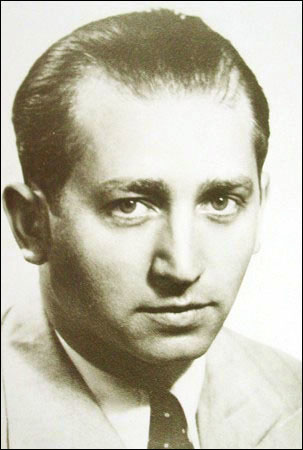
As political forces from the extreme right in Romania grew stronger, mainly after 1933, and the denial of Jewish writers’ legitimacy and their rejection escalated, some prominent Jewish writers were engaged in fierce confrontations in defense of their legitimacy and against anti-Semitism.
In those years, for all those Jewish writers who identified themselves as Romanian writers, the attacks from the anti-Semitic camp were not the most difficult to bear, but rather the silence of their Romanian colleagues. The most famous of such debates involved Mihail Sebastian and Felix Aderca. A scandal was set off by Sebastian’s novel De două mii de ani (For Two Thousand Years, 1934), dealing with the themes of dual cultural roots and the confrontation with anti-Semitism. The preface written by the philosopher Nae Ionescu, Sebastian's former spiritual guide who had converted to the ideology of the Iron Guard, was a clear theological justification of anti-Semitism. Although shocked by Ionescu’s preface, Sebastian published it, but then refuted its anti-Semitic arguments in his essay Cum am devenit hooligan (How I Became a Hooligan) published in 1935.
The denial of Jewish writers’ legitimacy, supported in “scientific” studies on the Jews’ racial inferiority and on the harmful “Judaic spirit,” as well as in aggressive press campaigns, also led to administrative measures: Jewish writers were excluded from the Romanian Writers Society in 1937. The ban prevented them from publishing in the Romanian press, their books were removed from bookshops, and lists with writers’ “true” Jewish names were published. In just a few years, all these writers, regardless of what they considered themselves or of how attached they were to Romanian culture, ended up excluded from Romanian literary life.
During World War II, Jewish writers shared the wave of discriminatory laws and the threats of deportation and death. As they were prevented from publishing, some continued their work focusing more than before on Jewish themes, or kept journals. Felix Aderca wrote a play on the Dreyfus Affair, and others like Mihail Sebastian, Emil Dorian, Maria Banuş, kept journals, creating outstanding testimonies on the Jewish intellectuals’ life under the Antonescu regime, and on the Jewish community’s confrontation with everyday threats of deportation, deprivations, and anti-Semitic laws.
Alexandru Mirodan, Dicționar neconvențional al scriitorilor evrei de limbă română, 2 vols. Tel Aviv, 1986–1997
Leon Volovici, Nationalist Ideology and Antisemitism: The Case of Romanian Intellectuals in the 1930s, trans. Charles Kormos , Oxford, 1991
Henri Zalis, ed., Contribuția scriitorilor evrei la literatura română, Bucharest, 2001